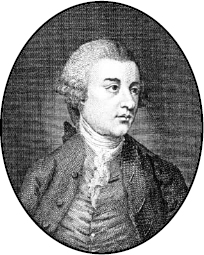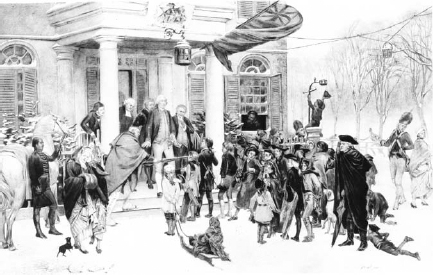American Tempest (30 page)
Authors: Harlow Giles Unger


Facing the loss of his Ohio properties, Patrick Henry raced to the capital in Williamsburg to organize Virginia's collective response, urging the Assembly to support Massachusetts and railing at the king, his ministers, and Parliament for starving the people of Boston. Henry worked gallery spectators into such a frenzy that, according to one witness, “some . . . ran up into the cupola [of the capitol] and doused the royal flag which was there suspended.”
35
Outside the Assembly hall, Henry's words roused people to action. Farmers along the shores of Chesapeake Bay sent a huge supply of grain to Bostonians to ease the shortage created by the Boston Port Bill. The
Virginia Gazette
suggested a ban on horse racing and urged bettors to contribute moneys they would have spent on races to help relieve Boston. In Henry's native Hanover County, farmers and other freeholders rallied around him, declaring,
We are free men; we have a right to be so. . . .
We will never be taxed but by our own representatives
; this is the great badge of freedom, and British America hath been hitherto distinguished by it. . . . Whether the people there [at Boston] were warranted by justice when they destroyed the tea we know not; but this we know, that the Parliament, by their proceedings, have made us and all North America parties . . . if our sister colony of Massachusetts Bay is enslaved we cannot long remain free. . . . We recommend . . . a hearty union of all our countrymen and sister colonies. UNITED WE STAND, DIVIDED WE FALL.
36
With Virginia pledged to support Massachusetts Patriots, other colonial committees made plans for an intercolonial congress in Philadelphia in September 1774. In anticipation, the Massachusetts committee drew up another, more sweeping covenant under which delegates would bind their colonies to stop importing British goods and end all business dealings with Britain effective October 1âunless Parliament reopened the port of Boston and repealed the Coercive Acts.

”We Must Fight!”
I
n anticipation of the day when the Boston Port Bill would take effect, Patrick Henry, Thomas Jefferson, and other members of Virginia's committee of correspondence “cooked up a resolution . . . appointing the first day of June for a day of fasting, humiliation and prayer to implore heaven to avert the evils of civil war, to inspire us with firmness in support of our rights, and to turn the hearts of the King and Parliament to moderation and justice.”
1
More important than the prayers it generated, Henry's resolution served as a symbol of Virginia's unity with Massachusetts and the other American colonies in their opposition to the Coercive Acts. Without support from the powerful Virginians, the other colonies knew they would be unable to confront, let alone rebuff, the powerful British empire. With Virginia, they could now resist the British with confidence of success.
“The reception of the truly patriotic resolves of the House of Burgesses of Virginia gladdens the hearts of all who are friends to liberty,” Samuel Adams exulted to Virginia's Richard Henry Lee. The
New Hampshire Gazette
was even more ecstatic: “Heaven itself seemed to have dictated it to the noble Virginians. O Americans, embrace this plan of union as your life. It will work out your political salvation.”
2
Patriots along the Atlantic Coast now heeded John Hancock's Massacre Day appeal to arm themselves. Town after town formed militias, and all the colonies but Georgia answered Hancock's call to meet at an intercolonial congress in September.
On June 1, Gage closed Boston Harbor to all trade except fuel and imposed virtual martial law on the city. Even ferries to Charlestown and Cambridge ceased operations. The following day Parliament passed still another Coercive Act that permitted quartering British troops in private homes. Somehow, Hancock got word to the captain of his last remaining ship in London to fill the hold with gunpowder to smuggle across the Atlantic to Salem.
On June 7, Gage convened the Massachusetts legislature in Salem, but instead of following Gage's agenda, the representatives barred the doors, pledged unanimous support for Boston, and appointed five delegates to go to Philadelphia to the Continental Congress the following September: Thomas Cushing, James Bowdoin, Robert Treat Paine, and John and Sam Adamsâthree merchants, a lawyer, and a bankrupt brewer. Hancock turned down the chance to go to Philadelphia, preferring to remain in Boston where, in the absence of Sam Adams and other Patriot leaders, he could consolidate his own power in Massachusetts as moderator of the Town Meeting, Speaker of the House of Representatives, and
de facto
leader of the Sons of Liberty and Tea Party Patriots. It was a brilliant political decision.
When Hancock got home to Beacon Hill, Gage sent him a message dismissing him as Colonel of the Corps of Cadets for failing to command them to salute on the day of the governor's arrival at Province House. To the governor's astonishment, the entire company responded by resigning. “The Governor appeared to be much agitated as the committee came upon him quite sudden and unexpectedly,” said a Hancock aide. “Had he known our intention he would have prevented it by disbanding us before we would put it in execution. This we foresaw . . . and I was highly pleased to find that we had out-generaled the general.”
3
Within a few weeks the port closure created food shortages in Boston and sent prices soaring beyond the reach of the poor and unemployed. On June 28, however, a flock of more than two hundred sheep arrived at Boston Neck from Windham, Connecticut, with a letter: “This Town is very sensible
of the obligations we, and with us, all British America, are under to the Town of Boston who . . . are the generous defenders of our common rights and liberties.”
4
On the same day, Groton, Connecticut, sent forty bushels of rye and corn, followed by more than one hundred sheep and some cattle a few weeks later. During the summer, a dozen more Connecticut towns sent similar gifts, and over the months that followed towns and cities throughout the colonies sent hundreds of sheep and thousands of bushels of grain and produce to try to feed the people of Boston. It was not enough, though, and as hunger spread across Boston, a group of mothers sent their boys to plead with General Gage to allow more food into the town.

Although the trade embargo left thousands out of work, Sam Adams formed a Committee of Ways and Means to organize public works and a Committee on Donations to collect money to pay for them. Unemployed men went to work repairing the town's pavements, operating the brickyard, digging a town well, and building a new town wharf. The committee set up looms for weavers to make clothes and a distribution center for
wool, flax, cotton, leather, and other materials for producing clothes. Although the town's morale rose, tensions rose higher, with soldiers nervously patrolling every street. Even the sound of church bells signaling a fire sent soldiers running for cover.
Before the Boston delegation could leave for Philadelphia, James Bowdoin fell ill. Although the others pleaded with Hancock to fill his place, Hancock refused, insisting that Boston needed at least one leader at home to command the Sons of Liberty and represent the city at a forthcoming provincial congress. Hancock hosted a farewell dinner for the four remaining delegates, and the following morning they gathered at Cushing's mansion. In full view of British troops, they boarded Cushing's coach and fourâits two drivers conspicuously armedâand trotted off on the six-day trip to Philadelphia.
Gage reacted to what he saw as an implicit threat of revolution by sending troops to Cambridge and Charlestown to seize the provincial militia's arms and ammunition. They found none. The Patriots had anticipated his move and rolled the Charlestown cannons to secret hiding places. Fearing attack, Gage began fortifying Boston Neck, the narrow strip of land connecting Boston to the mainland.
“The flames of sedition have spread universally throughout the country, with daily publications of determined resolutions not to obey the late acts of Parliament,” Gage wrote to Lord Dartmouth, the king's counselor and secretary of state for colonial affairs. “The country people are exercising in arms in this province. Connecticut and Rhode Island are getting magazines of arms and ammunition . . . and such artillery as they can procure. . . . Sedition flows copiously from the pulpits.” Gage reported that scattered mobs were roaming the countryside assaulting suspected Loyalists and that jurors refused to serve in court before the impeached Chief Justice Peter Oliver. In the face of near anarchy, Gage wrote, customs officials at other Massachusetts ports had fled to the safety of Boston, and he said he feared for his personal safety without the protection of his troops.
5
On September 5, fifty-six delegates from all the colonies except Georgia assembled for the first time in colonial history at a gathering in Carpenter's Hall, Philadelphia, which the press dubbed the Continental Congress. All but seven delegates were or had been members of their own colonial assemblies,
and nine were speakers or former speakers. All except Sam Adams ranged from relatively wealthy to incredibly so. There were five northern farmers, seven southern planters, thirty lawyers, and fourteen businessmen, of whom eleven were merchants, one a builder, one a miller, and another a wharf owner. By unanimous vote, they elected president Virginia's Peyton Randolphâa lawyer, owner of a large plantation, and head of the seven-man delegation from America's most powerful colony. With Randolph were three other lawyers, among them Patrick Henry, and three of the colony's largest plantersâBenjamin Harrison, Richard Henry Lee, and George Washington. Like northern merchants, wealthy southern planters had been boycotting British imports to try to force repeal of duties. Washington summed up his motive for joining the boycott succinctly: “They have no right to put their hands in my pockets.”
6
Washington, of course, had some of the deepest pockets in America, with a huge property of more than twenty thousand acres, including eight thousand acres of tobacco and wheat at Mount Vernon, about three hundred slaves, a fishery, a grist mill, and, until the Quebec Act, title to about one hundred thousand acres of wilderness in western Virginia and the Ohio Country.
